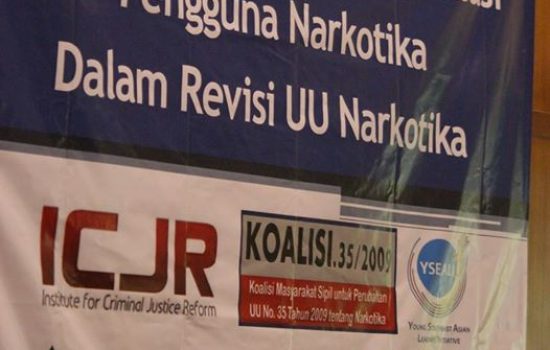The National Alliance for Penal Code Reform and ICJR reject the use of the Delphi Method by the Government to determine the length of criminal sentences. We also request that the House of Representatives give more critical regard to these proposals from the Government because the determination of criminal sanctions is very fundamental to the making of law.
In the past, The National Alliance for Penal Code Reform and ICJR has emphasized the importance of the government having a scheme and method to determine the pattern and the amount of the criminal sanctions in the new penal code. The reason being that unjustified and overly long sentences will firstly, potentially cause overcriminalization in Indonesia. Secondly, it will potentially increase the budget required for the penitentiary, as well as the budget for the law enforcement officers. Thirdly, it will potentially increase the overcrowding of the penitentiary, which became the main focus in the President Jokowi Widodo era. Finally, there is increased the potential of arbitrary law enforcement in society using the new criminal law.
At the consigning of the new penal code between House of Representatives and the Government, which took place on 15th January 2018 at Le Meridien Hotel, the Government explained the use of Delphi Method to determine the pattern and the number of criminal sanctions.
The National Alliance for Penal Code Reform and ICJR argue that the Delphi method is a well-known research method, which can be used to provide information on the average amount of the criminal sanction. Thus, this method is used by the prosecutor to formulate their charges (law enforcement), which it cannot be compared peer to peer with the method to determine the pattern and the amount of criminal sanction in the legislation phase (lawmaking).
The National Reformation for the New Penal Code Alliance and ICJR argue that the Delphi method is being used simply to legitimize the Government’s determined sentences in the new penal code, which are excessive and have potential to lead to overcriminalization.
The Government and House of Representatives should conduct research on the practices that have developed in the courts regarding criminal punishment. The Court is the mechanism through which criminal punishment is interpreted. Therefore, it is irrational for the Government to increase the criminal sanctions without considering the practice of the courts.
Therefore, The National Alliance for Penal Code Reform and ICJR reject the use of the Delphi method and urge the Government to conduct further research and evaluation into the determination of the new criminal sanctions. Furthermore, The National Alliance for Penal Code Reform and ICJR recommend the following 5 steps be used by the House of Representatives and the Government to determine the appropriate criminal sanctions:
1). First, for the delict offenses that are adopted from the previous Penal code, the Government should use the same criminal sanction. Basically, the rationale behind the determination of criminal sanction in the new penal code should imitate the previous penal code;
2). Second, in the case of enhancement of the criminal action from the existing delict offenses and already stipulated in the current penal code, the criminal sanctions should refer to the previous Penal code;
3). Third, the House of Representatives should request the government to conduct research into, and evaluation of, the practice of sentencing in the court. The results should then be compared with the criminal sanction currently recommended. If the result shows that the current charges and sentences are smaller, it implies that there is no legal reason to increase the amount of the criminal sanction. For example, a defamation case sentence is on average 3 months imprisonment or adultery, the average is 3.5 months imprisonment;
4). Fourth, the Government and the House of Representatives shall increase the effectiveness and implement the fine sanction in the new penal code as one of the criminal sanctions that can be an alternative to the imprisonment sentences. This measure is necessary as a stepping stone to decreasing the number of prisoners;
5). Fifth, the Government and the House of Representative shall take serious measures regarding the budgeting of the law enforcement. The efforts to criminalize an action are more based on political determination rather than based on the law enforcement financial. Without conducting an evaluation on the basis of the law enforcement financial plan, it may lead to a significant increase of the State Budget for the criminal law enforcement.
In conclusion, The National Alliance for Penal Code Reform and ICJR urge the House of Representatives to maintain their criticism towards the proposal from the Government, the pattern and the determination of the criminal sanction are very fundamental in the making of law. It can be seen that every law that has been made by the Government does not have a proper basis regarding the number of criminal sanctions. A random pattern to determine the criminal sanctions by the Government has happened because the Government did not conduct any research on the practice of sentencing in the court. Thus, the House of Representatives should take serious measures regarding this situation and the Government should be responsible for fixing the situation at hand.
Institute for Criminal Justice Reform




